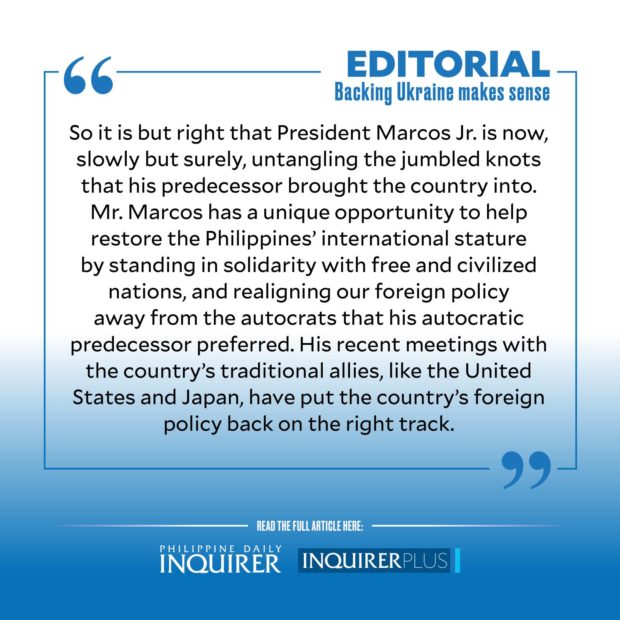Backing Ukraine makes sense
 I don’t think there is a need to take a stand.”
I don’t think there is a need to take a stand.”
Thus said then presidential candidate Ferdinand Marcos Jr. a year ago when asked by reporters about his stance on Russia’s invasion of Ukraine barely a week before that. “We are not involved, except for our nationals.”
Two weeks ago, the now President Marcos Jr. held a telephone conversation with Ukraine President Volodymyr Zelenskyy, telling the heroic leader that he and the Filipino people admired the bravery and nationalism of the Ukrainians, and that our nation joins them in their quest for peace and a peaceful resolution of the conflict.
What a difference a year makes. And what a welcome change it is, even though if it is being done—for now—in baby steps, rather than the long strides needed to return the Philippines to the international stature that was eroded by the previous administration.
When Russia invaded Ukraine on Feb. 24 last year, much of the world recoiled in horror and spoke up in near unison, condemning the brazen aggression of Russian President Vladimir Putin against its peaceful neighbor, whose only offense was wanting to wiggle free of Russia’s sphere of influence and aligning itself more with the West.
But not immediately so in the Philippines, where the administration put forward the line that the Russia-Ukraine war was not our concern since it was happening almost half a world and several time zones away.
In fact, then President Duterte specifically said that the Philippines must stay neutral. “That’s not our fight. Let’s not interfere,” he said, even as the international press and social media were flooded with horrible images of dead Ukrainian civilians lying in the streets after being mowed down by invading Russian troops in the city of Bucha.
At the same time, Duterte was marching in lockstep with the idea being promoted by Russian ultranationalists, and by Putin himself, that nuclear war was a real possibility—something most international observers, diplomats, and military strategists now believe is a bluff.
Duterte even said: “I’m hurting because Putin is my friend. He’s a personal friend.”
Naturally, this stance was adopted by many sycophantic supporters of the administration, including its army of social media trolls who went to town mouthing the line that Filipinos should look after their own interests and not get involved in a faraway war.
It was not until a few more weeks later that the tide began to turn, ever so slowly at first, when the Department of Foreign Affairs led by then Foreign Affairs Secretary Teodoro Locsin Jr. voted in favor of a United Nations resolution, condemning Russia’s aggression and calling for an end to the conflict—a move that surprised not only external observers, given Duterte’s previous declarations, but even those within the administration as well.
And if the experience of Filipinos this past year is any indication, the mindset that the Russia-Ukraine conflict is none of our business and has no effect on the Philippines anyway is absolutely nonsense.
One only has to look at the country’s inflation rate, which has been crushing many Filipinos under the heavy burden of higher prices, from the most basic of food products, all the way to essential services like transportation.
For one, Russia’s invasion of Ukraine sent energy prices through the roof, and they have yet to recover to more reasonable levels. Over the last year, Filipinos have been paying more at the pump for gasoline, diesel, and kerosene, with diesel having a particularly adverse impact on the economy because it is the fuel most heavily used in the logistics sector. More expensive fuel means more expensive goods, including the meat and vegetables that need to be transported from the provinces to the cities.
The conflict also pushed up the prices of fuel for the country’s power plants. And today, Filipinos are having to pay higher monthly electricity bills as a consequence.
Similarly, the conflict jacked up the prices of raw material inputs used in food production, from pork to fish to poultry. Everywhere there are high prices, the Russia-Ukraine conflict has contributed to them.
So it is but right that Mr. Marcos is now, slowly but surely, untangling the jumbled knots that his predecessor brought the country into.
Mr. Marcos has a unique opportunity to help restore the Philippines’ international stature by standing in solidarity with free and civilized nations, and realigning our foreign policy away from the autocrats that his autocratic predecessor preferred. His recent meetings with the country’s traditional allies, like the United States and Japan, have put the country’s foreign policy back on the right track.
Nothing is more practical and rationale for the Philippines at present than standing up to bullies and aggressors, whether they be far, like Russia, or near, like China, because of the strategic but precarious situation we find ourselves in right in this region.
What a difference a year makes. And what a welcome change it is.




















